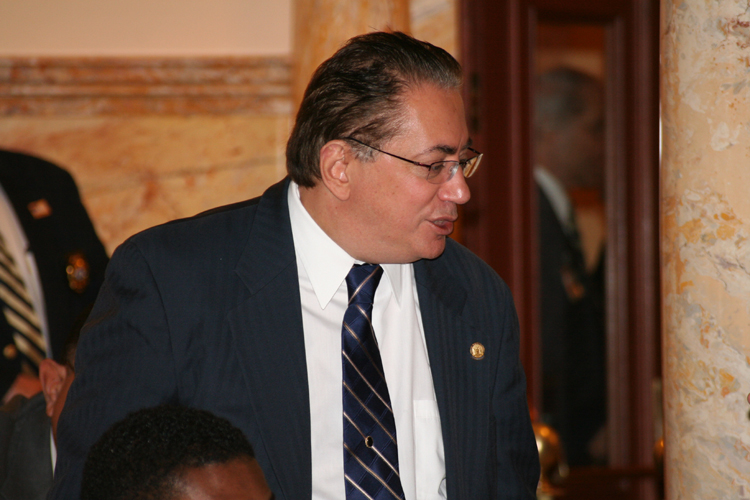
Senate Transportation Chair Says When Public Utility Companies Delay Transportation Infrastructure Projects, They Should Pay the Added Costs
TRENTON – Senator Nicholas J. Sacco, the Chairman of the Senate Transportation Committee, will formally introduce legislation tomorrow which would require public utility companies and the State Department of Transportation (DOT) to work collaboratively to develop a plan to relocate utility equipment and facilities to accommodate a road construction project. The bill would hold public utilities liable if they fail to meet the construction schedule laid out for equipment relocation, causing cost-overruns in the transportation improvement project.
“Whenever a public agency engages in a transportation infrastructure project, there are significant costs associated with the relocation of utility facilities and equipment,” said Senator Sacco, D-Hudson and Bergen. “While I think it’s appropriate that the cost of relocating that equipment is borne by the agency completing the road project, the utility company should be held responsible if the project is delayed as a result of its failure to provide support in a timely manner, causing cost overruns in the construction budget. This bill creates some fairness when public utility infrastructure has to be moved on account of a road construction project, and it creates a mechanism to save taxpayer and transportation dollars should the project costs increase as a result of the utility’s failure to act quickly.”
Senator Sacco noted that the issue was brought to his attention as a result of the delays in the Tonnelle Avenue widening project in North Bergen. One of the reasons why the project has been delayed so many times, according to Senator Sacco, is that construction has had to come to a halt several times to accommodate for the relocation of utility infrastructure. Senator Sacco also pointed to news reports today about the delays in widening a section of Route 3 near MetLife Stadium in Rutherford – delays caused by utility infrastructure issues, according to the lead contractor, which could lead to construction still taking place when New Jersey hosts the Superbowl in 2014 – as yet another reason for cracking down on utility companies that drag their feet, needlessly extending a road construction project.
“Whether we’re talking about Tonnelle Avenue in North Bergen, or Route 3 near MetLife Stadium, these project delays could cost taxpayers millions of dollars in cost overruns, and create endless headaches for commuters stalled as a result of extended road construction,” said Senator Sacco. “In 2014, New Jersey is going to be on a national stage, hosting arguably the biggest event in professional sports, and the image that visitors to our state will take away will be the traffic snarls and road cones leading up to the stadium. It’s long past time that utility companies take some measure of accountability and responsibility for road construction delays caused by their inability to create a plan to move their utility facilities in a timely manner.”
The bill expands the current requirement that a public utility or a cable television company must accommodate and relocate facilities when necessary for transportation infrastructure projects, at the direction of the State Department of Transportation (DOT). Under the bill, public utility facilities would include tracks, pipes, mains or laterals, electric conduits, access manholes, cables, wires, towers, poles, telecommunications or data transmission equipment, or other equipment, appliances or apparatus not including railroads.
The bill creates a process whereby the DOT and a utility company would establish and assign responsibility for the relocation of utility facilities within the limits of construction projects. The bill permits the department to manage utility relocations through its construction contract, and allows the department’s contractor to control the project’s construction schedule and the timing for utility facilities relocation work. Under the bill, the DOT would be able to hold a utility company liable for failing to provide necessary data and support during the design process, or failure to relocate their facilities according to the construction schedule, resulting in a construction delay in the transportation infrastructure project. The utility company would be required to pay any added costs resulting from its delay in the relocation of its facilities.
“All too often, we’ve seen construction delays result in huge cost overruns for public transportation infrastructure projects,” said Senator Sacco. “When public utility companies fail to adhere to the construction schedule to relocate their equipment, the project takes longer, causing added inconvenience to motorists, and added costs to the project budget. By holding utility companies liable for the costs associated with their delay in accommodating for the relocation of their equipment, we’re creating a disincentive for these companies to drag their feet, ensuring projects get completed on time and on budget, and that the public has as little disruption to their commute as possible.”
The bill is expected to be referred to the Senate Transportation Committee for consideration.

